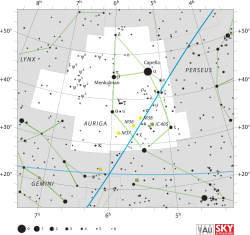Sigma Aurigae

| |
| Observation data Epoch J2000 Equinox J2000 | |
|---|---|
| Constellation | Auriga |
| Right ascension | 05h 24m 39.14261s[1] |
| Declination | +37° 23′ 07.2494″[1] |
| Apparent magnitude (V) | 4.99[2] |
| Characteristics | |
| Spectral type | K4 III[3] |
| U−B color index | +1.75[2] |
| B−V color index | +1.42[2] |
| R−I color index | 0.53 |
| Astrometry | |
| Radial velocity (Rv) | –19.7[4] km/s |
| Proper motion (μ) | RA: +0.71[1] mas/yr Dec.: –11.51[1] mas/yr |
| Parallax (π) | 6.98 ± 0.33[1] mas |
| Distance | 470 ± 20 ly (143 ± 7 pc) |
| Details | |
| Surface gravity (log g) | 1.75[5] cgs |
| Temperature | 4,080[5] K |
| Metallicity [Fe/H] | –0.03[5] dex |
| Rotational velocity (v sin i) | 10[6] km/s |
| Other designations | |
Sigma Aurigae (σ Aur, σ Aurigae) is the Bayer designation for a double star[8] in the northern constellation of Auriga. It is faintly visible to the naked eye with an apparent visual magnitude of 4.99.[2] With an annual parallax shift of 6.98 mas,[1] it is approximately 470 light-years (140 parsecs) distant from the Earth. This is an evolved giant star with a stellar classification of K4 III.[3] It has a magnitude 11.2 companion at an angular separation of 8.7 arcseconds.[8]
References
- 1 2 3 4 5 6 van Leeuwen, Floor (November 2007), "Validation of the new Hipparcos reduction", Astronomy and Astrophysics 474 (2): 653–664, arXiv:0708.1752v1, Bibcode:2007A&A...474..653V, doi:10.1051/0004-6361:20078357. Note: see VizieR catalogue I/311.
- 1 2 3 4 Argue, A. N. (1966), "UBV photometry of 550 F, G and K type stars", Monthly Notices of the Royal Astronomical Society 133: 475–493, Bibcode:1966MNRAS.133..475A, doi:10.1093/mnras/133.4.475.
- 1 2 Roman, Nancy G. (July 1952), "The Spectra of the Bright Stars of Types F5-K5", Astrophysical Journal 116: 122, Bibcode:1952ApJ...116..122R, doi:10.1086/145598.
- ↑ Famaey, B.; et al. (January 2005), "Local kinematics of K and M giants from CORAVEL/Hipparcos/Tycho-2 data. Revisiting the concept of superclusters", Astronomy and Astrophysics 430 (1): 165–186, arXiv:astro-ph/0409579, Bibcode:2005A&A...430..165F, doi:10.1051/0004-6361:20041272.
- 1 2 3 McWilliam, Andrew (December 1990), "High-resolution spectroscopic survey of 671 GK giants. I - Stellar atmosphere parameters and abundances", Astrophysical Journal Supplement Series 74: 1075–1128, Bibcode:1990ApJS...74.1075M, doi:10.1086/191527.
- ↑ Bernacca, P. L.; Perinotto, M. (1970), "A catalogue of stellar rotational velocities", Contributi Osservatorio Astronomico di Padova in Asiago 239 (1), Bibcode:1970CoAsi.239....1B.
- ↑ "sig Aur -- Star in double system", SIMBAD Astronomical Database (Centre de Données astronomiques de Strasbourg), retrieved 2012-08-22.
- 1 2 Eggleton, P. P.; Tokovinin, A. A. (September 2008), "A catalogue of multiplicity among bright stellar systems", Monthly Notices of the Royal Astronomical Society 389 (2): 869–879, arXiv:0806.2878, Bibcode:2008MNRAS.389..869E, doi:10.1111/j.1365-2966.2008.13596.x.
External links
| ||||||||||||||||||||||||||||||||||||||||||||||||||||||||||||||||||||||||||
This article is issued from Wikipedia - version of the Monday, March 02, 2015. The text is available under the Creative Commons Attribution/Share Alike but additional terms may apply for the media files.